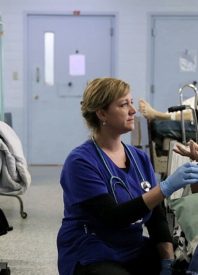
The American Nurse has its share of showing people who work within the confines of either hospitals of clinics. But it mostly shows the differences within the healthcare landscape. There’s a marvelous way in the way this documentary physicalizes those landscapes. It either follows footsteps pattering down a sanitized hospitals or surprisingly enough, a farm where Sister Stephen works. In the case of one of the nurses, we see Tonia Faust and her mother through the barbed wire of a prison, where she works with elderly inmates.
The American Nurse’s interview segments are better than average. It’s not just the nurses who get camera time but their family as well. Tonia’s mother talks about how nerve wracking it is. The mother worked in the same prison, Angola in Louisiana, as a guard tower. She tells the camera how there’s no way to prepare oneself even for the job that institutions haired them to do. Healthcare, then, is a way to unlearn an economy usually existing to oppress people.
Director Carolyn Jones also captures a binary between nurse and patient. Naomi Cross is a labor and delivery nurse and Johns Hopkins. Despite being around weary mothers to be at a daily basis, she has to keep a happy face, sometimes asking questions to keep their mind off of their physical and sometimes financial pain. I keep reminding myself that Jones shot and released this during the second Obama administration and before these times, but healthcare workers still stepped up then.
Another binary that Jones explore is between the audience’s perceptions of bodies and what they’re like in real life. Jones also lets us hear these nurses narrate and explain how complex things are while we see them in practice. Brian McMillion is a military nurse who served alongside soldiers during one of the Gulf Wars. Some of his practice takes place in group setting, talking to veterans. When we hear the word ‘soldier’ we see someone in their physical prime. But Jones is frank with these group meetings.
Jones normalizes fallibility and showing that someone is there to care for people we deem ‘imperfect’. The film’s voices are as reassuring as Jones’ prologue. Jason Short works in one of the poorest counties in America. He goes house to house in bedrooms where his patients would spend their last days. But he’s here to examine their eyes or any part of their body that need attention.
Jason Short is one nurse per one hundred Americans. Jones shows five of those people, giving the lesser fortunate the dignity they deserve. Film lovers usually see grisly visuals, but they’re usually in genres that demean characters. Seeing an exposed bone or intestines here drove the point that we’re lucky to have people bandage us. They’re the heroes we need and don’t deserve.
The American Nurse is available for free in KinoNow until the end of May.

